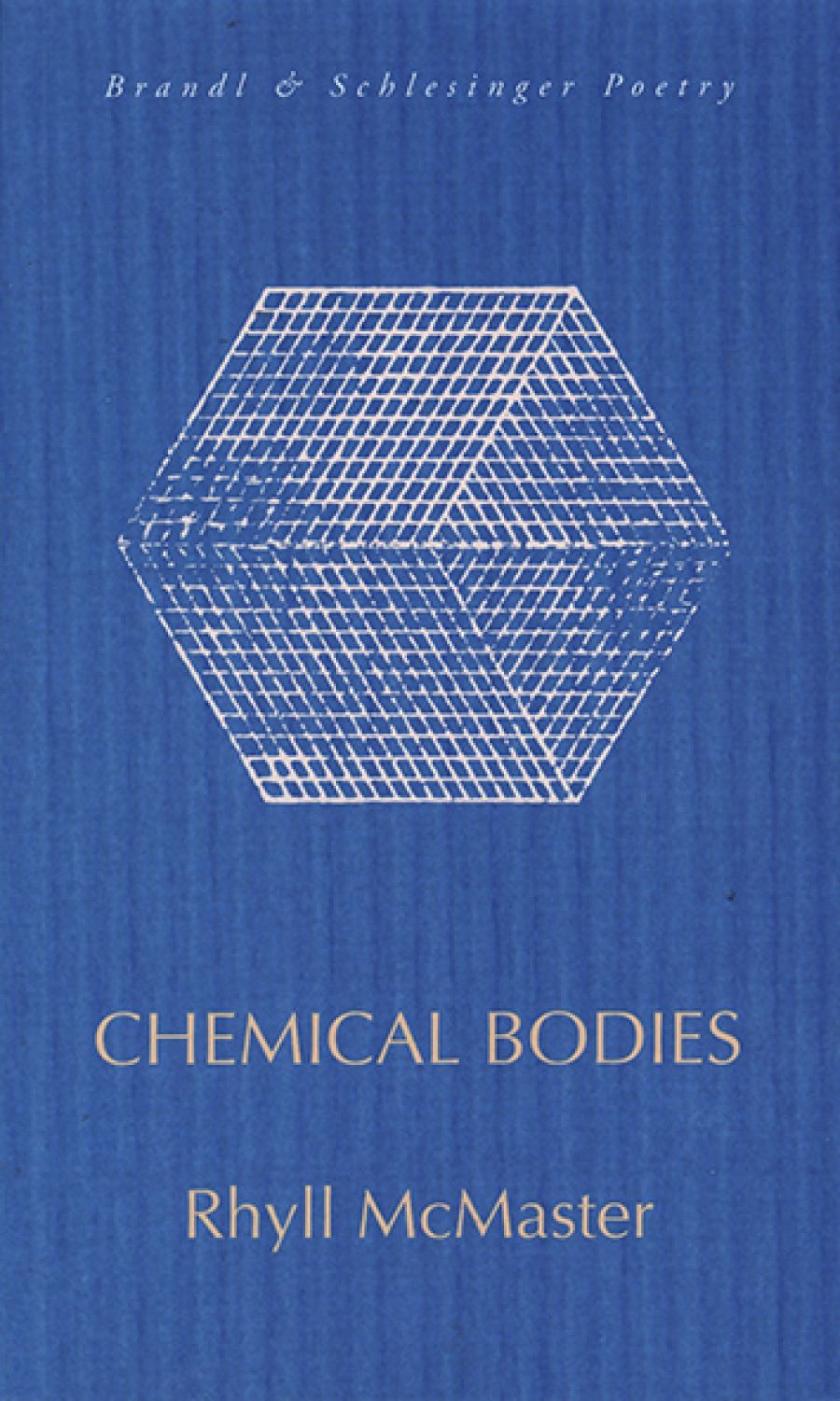
- Free Article: No
- Contents Category: Poetry
- Review Article: Yes
- Article Title: Married to Matter, Inexorably
- Online Only: No
- Custom Highlight Text:
There are two reasons for celebrating this chastely elegant slim volume. One is the arrival of a publisher prepared, when major firms are retreating from the field, to declare that poetry is central to a flourishing literary culture, and to match that declaration by commitment to a new series, Brandl & Schlesinger Poetry. The other is the appearance of a new and striking collection from that fine poet Rhyll McMaster.
- Book 1 Title: Chemical Bodies
- Book 1 Biblio: Brandl & Schlesinger, $16.95pb, 75pp
It is one that will call for some readjustment of her reputation. Given the relatively long gaps between The Brineshrimp (1972), Washing the Money (1986), and On My Empty Feet (1993), she has been seen as one of our non-prolific poets, but now that Flying the Coop, her New and Selected volume of 1994 is followed by this collection of sixty-two poems dated from July 1994 to July 1997, this may have to be reconsidered. More importantly, these poems offer us the excitement of seeing a poet, who has already achieved a high degree of mastery in a certain kind of poetry, strike out in mid-career into a new mode.
In Washing the Money, McMaster’s poetic reconstructions of the Brisbane of her childhood, its holiday houses, its cars and trams, its family occasions, shimmered with a loving luminosity, tempered from sentimentality by a precision and wit of imagery. In On My Empty Feet the sequence ‘My Mother and I Become Victims of a Stroke’ gave a memorably moving and perceptive account of a prickly, difficult, bonded, mother–daughter relationship. Perhaps we had come to too easy a belief that she could be summed up in the words she herself provides in Chemical Bodies in ‘Imprint’:
I am the hummer
of all I remember.
This is my shape of salvation;
what was,
who I am.
Certainly no admirer of McMaster’s past work could regret the lines of continuity that run into ‘Mr Leadbetter’s Band’ or ‘Standard Domestic’ where the poet remembers ‘My mother lashed herself to icons / of a domestic nature’. But McMaster is not lashing herself here to ‘icons of a domestic nature’. The kind of change of direction she is charting can best be indicated by three quotations:
Though consciousness may consign
our cast-offs to the great
Op Shop of the past,
being matter we remain,
everlasting, a molecular concentrate,
capable of monstrosities or their opposite.(‘Capabilities’)
We will bore, if we can, tunnels
into the divine fabric
of the last enchanted molecule.(‘The Pleat’)
Matter and order appear,
plus chaos.
And the explicable
universe shimmers.(‘Notions’)
It is not that she has abandoned the world of material objects for abstractions; rather that she has turned to a probing of the constitution of that material world and of our knowledge of it which is both more analytic and more chastening. ‘Married to matter, inexorably’, she writes in ‘Married to the Mob’, ‘I am the still observer of this simplest state / this unfair arrangement of molecules’.
Such observations may lead to ‘The Big Question’ – ‘How did the world begin?’ But if such a question ‘points inexorably / to the unknown’,
Why does stopping there
create a schism of distress?
We roll and complain
in our mythology,
caustic in our assertion that
there is a pea
under the mattress.
It is hard to think of another poet, now that Gwen Harwood is gone, who could get away with such a tonal mix, simultaneously serious, deflating, and consoling about human self-consciousness. And it is surely impossible not to be delighted as well as threatened by the vision of human experience of reception and resistance in ‘Receptacle’. A receptive, unresistant, unlidded rubbish bin that grows wheels and a will of its own to be autonomous becomes dangerous and endangered:
An unbiddable bin
is a doomed bin,
just begging to be replaced
by a stationary bin,
with no arms, no legs
no face.
The poems of Chemical Bodies are enclosed between a prelude, ‘What the Brain Tells Us’ and a postscript ‘In Which Reality is a Collusion Between Minds and What is Out There’. In a way these poems suggest that McMaster’s new direction is bringing back into play some of the ways of imagining the external world that were so distinctive in The Brineshrimp. So the brain tells us that
seawater is minutely full
of distant motives
and to be safe
is to be unstable,
is to cavort
in oscillating equilibrium,
tenacious as a seahorse on a weed,
Part of the oscillating equilibrium in this volume comes from a sometimes sombre awareness of the susceptibility of chemical bodies to dissolution:
Dead. Death.
It deals a flat blow,
a fist to the mirror,
but then turns soft as a black, spiked cushion,
becomes ethereal.
Yet still she can turn in ‘The Letter to be Written’ to ‘Dear Practical Life’, praising it because
you remember me to the essential
mundane, the purring cat,
confluence of relations and friends,
cell-memory of children,
a soft finger.
Here is a book for slow and pleasurable reading, in which lines missed the first time round will suddenly reach up a ‘communing inquisitive face’, offering you, like this reviewer, a multiplicity of tempting quotations.


Comments powered by CComment